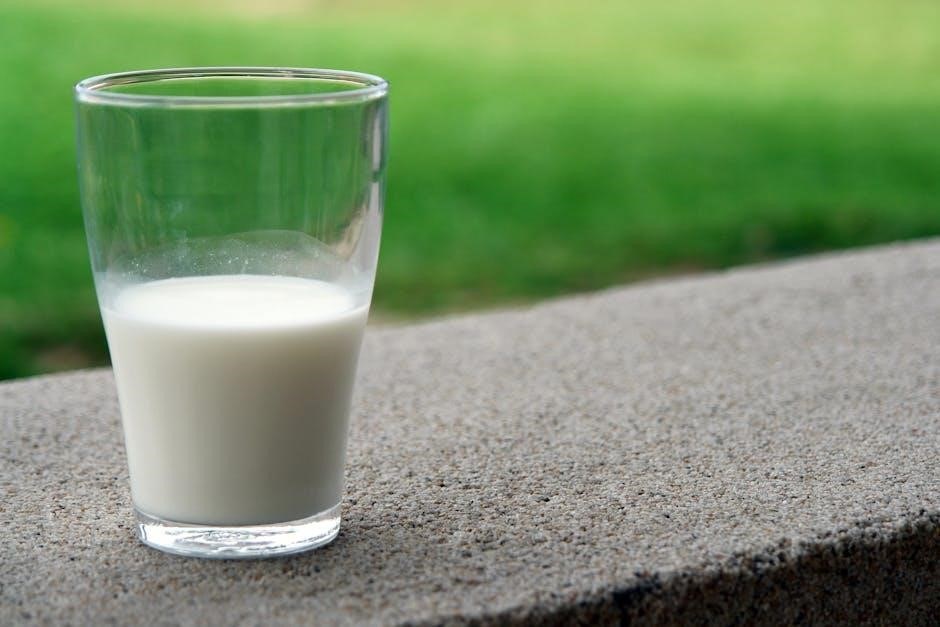Non-dairy calcium-rich foods are essential for maintaining strong bones and overall health, especially for those with dietary restrictions or preferences. Fortified milks, nuts, seeds, leafy greens, and enriched plant-based products provide ample calcium options, ensuring diverse and nutritious choices for everyone.
Overview of Calcium Importance and Non-Dairy Options
Calcium is crucial for bone health, muscle function, and nerve signaling. While dairy products are traditional calcium sources, non-dairy options offer equally effective alternatives. Fortified plant-based milks, such as almond, soy, and oat milk, are rich in calcium, making them ideal for those with lactose intolerance or plant-based diets. Additionally, nuts, seeds, and leafy greens provide significant calcium content. These non-dairy sources are versatile, allowing individuals to meet their daily calcium needs without relying on dairy products. Incorporating these foods into meals ensures a balanced diet, supporting overall health and bone strength. With the variety of non-dairy calcium-rich foods available, maintaining adequate calcium intake is accessible and delicious for everyone.

Fortified Non-Dairy Milks
Fortified almond, soy, coconut, and rice milks are excellent non-dairy sources of calcium, often matching dairy milk’s calcium content. They are lactose-free and nutrient-rich.
Almond, Soy, Coconut, and Rice Milks: Calcium Content and Benefits
Fortified almond milk contains approximately 450-500 mg of calcium per cup, making it a top choice for non-dairy calcium intake. Soy milk offers similar benefits, with around 300-400 mg per cup, and is also rich in protein. Coconut milk, while lower in calcium at about 40-50 mg per cup, adds variety to diets. Rice milk provides around 250-300 mg of calcium per cup and is hypoallergenic, suitable for those with nut allergies. These milks are versatile, used in cereals, smoothies, and recipes, ensuring a lactose-free diet remains calcium-rich. Their fortified versions are particularly beneficial for bone health and muscle function.

Nuts and Seeds as Calcium Sources
Nuts and seeds are excellent non-dairy calcium sources, with almonds leading at 264mg per 100g, supporting bone health and providing essential nutrients naturally.
Almonds: Highest Non-Dairy Calcium Content (264mg per 100g)
Almonds stand out as one of the richest non-dairy sources of calcium, offering an impressive 264mg per 100g. This makes them an excellent choice for those seeking to boost their calcium intake without consuming dairy products. Beyond calcium, almonds are packed with protein, healthy fats, and fiber, making them a nutritious and versatile snack. They are also versatile in use, whether enjoyed raw, roasted, or blended into almond butter for smoothies and recipes. Incorporating almonds into meals can significantly contribute to meeting daily calcium needs while providing additional health benefits like supporting heart health and satisfying hunger. For individuals with dietary restrictions, almonds are a convenient and delicious way to maintain strong bones and overall well-being.

Leafy Greens and Vegetables
Leafy greens and vegetables are vital non-dairy sources of calcium, offering essential nutrients for bone health. Non-oxalate varieties like kale, broccoli, and bok choy are particularly beneficial for calcium absorption.
Non-Oxalate Leafy Greens: Kale, Broccoli, and Bok Choy
Non-oxalate leafy greens like kale, broccoli, and bok choy are excellent sources of calcium, making them ideal for those seeking non-dairy options. These vegetables are rich in essential nutrients and offer high calcium absorption rates due to their low oxalate content. Kale provides approximately 200mg of calcium per 100g, while broccoli and bok choy contribute around 47mg and 77mg, respectively. Incorporating these greens into meals ensures a steady supply of calcium, supporting bone health and overall well-being. Pairing them with vitamin D-rich foods can further enhance calcium absorption. These versatile vegetables can be enjoyed in salads, stir-fries, or steamed dishes, making them a practical and nutritious addition to any diet.

Calcium-Enriched Plant-Based Products
Calcium-enriched plant-based products like tofu, edamame, and fortified cereals are excellent non-dairy sources. Tofu offers about 80mg of calcium per 100g, while fortified cereals can provide up to 300mg per serving.

Tofu, Edamame, and Fortified Cereals

Tofu, edamame, and fortified cereals are among the most convenient and versatile non-dairy calcium sources. Tofu, made from soybeans, contains approximately 80mg of calcium per 100g, while edamame offers about 63mg. Both are excellent plant-based protein sources and can be easily incorporated into meals. Fortified cereals are another great option, with some brands providing up to 300mg of calcium per serving. These products are often enriched with other nutrients like vitamin D, which enhances calcium absorption. Including these foods in your diet can help meet daily calcium needs without relying on dairy. They are particularly beneficial for vegans and those with lactose intolerance, offering a delicious and nutritious way to maintain bone health.

Fatty Fish as Non-Dairy Calcium Sources
Fatty fish like canned salmon and sardines (with bones) are rich in calcium, offering a non-dairy alternative. They provide essential nutrients and omega-3 fatty acids, supporting overall health.

Canned Salmon and Sardines (with Bones)
Canned salmon and sardines with bones are excellent non-dairy calcium sources, providing approximately 200-300 mg of calcium per 3-ounce serving; These fatty fish are rich in omega-3 fatty acids, vitamin D, and protein, making them a nutritious choice. The bones, which are soft and edible, are the primary source of calcium in these products. Regular consumption supports bone health, reduces inflammation, and promotes heart wellness. They are versatile and can be added to salads, sandwiches, or eaten as a snack. For those avoiding dairy, canned salmon and sardines offer a flavorful and convenient way to meet daily calcium needs without compromising on nutrition or taste.

Practical Tips for Incorporating Non-Dairy Calcium-Rich Foods
Non-oxalate leafy greens like kale, broccoli, and bok choy are rich in calcium and easy to absorb. Steaming or sautéing with garlic enhances their flavor and nutrition.
Portion Sizes and Meal Planning Strategies
Planning meals with non-dairy calcium-rich foods requires attention to portion sizes to meet daily calcium needs. Aim for 1,000 mg of calcium per day, spread across meals. Start with fortified milks like almond or soy milk, which provide 300 mg per cup. Incorporate nuts and seeds, such as almonds, in 1-ounce portions (28g), offering 80 mg of calcium. Leafy greens like kale and broccoli can be added in larger portions due to their lower calorie content. Tofu and edamame are excellent sources, with 250 mg per 3-ounce serving. Plan snacks like yogurt or smoothies with fortified ingredients. Balancing these foods ensures a steady intake of calcium without overloading on any single source. Consult a healthcare provider or dietitian for personalized meal plans tailored to your needs.